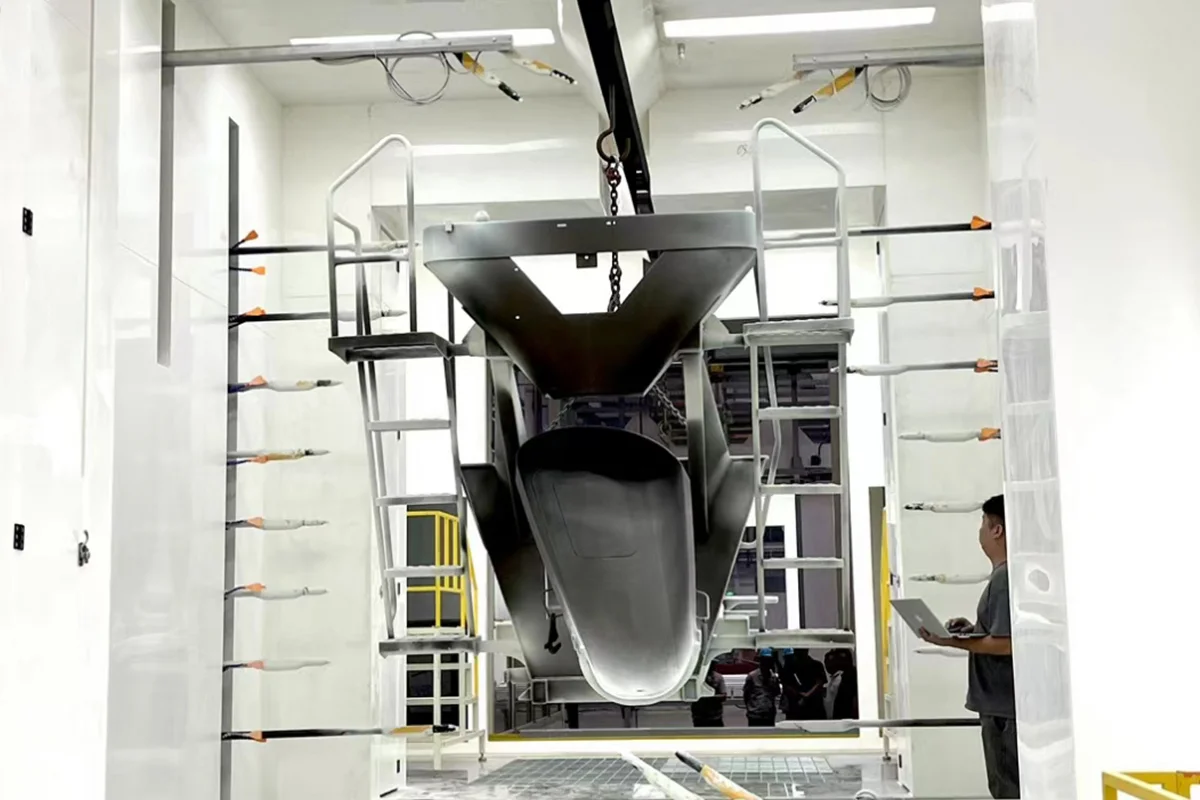- This topic is empty.
-
AuthorPosts
-
04/09/2025 at 16:38 #87162
The automatic powder coating line is an advanced surface finishing system that has revolutionized how industries treat and protect materials. Designed to apply powder coatings onto metals, plastics, and other substrates, this automated line integrates pre-treatment, spraying, curing, and inspection into one seamless process. With advantages such as high efficiency, environmental compliance, and superior coating quality, powder coating lines are now indispensable in automotive, appliance, construction, and electronics manufacturing. In this blog post, as high performance powder coating equipment manufacturer, Lexuan will share the principles of automatic powder coating line for sale, its process flow, advantages, applications, etc.
Basic Principles of Automatic Powder Coating Line
At the heart of an automatic powder coating line is the principle of electrostatic adsorption. Powder particles are charged and sprayed onto the surface of a workpiece, where they adhere due to electrostatic attraction. Once sprayed, the workpiece is moved into a curing oven, where heat causes the powder to melt, flow, and solidify into a durable and uniform coating.
This scientific yet practical method provides a high-quality finish that outperforms conventional liquid coatings in durability, adhesion, and resistance to corrosion and chemicals. The automation of this process ensures consistency across large-scale production while minimizing human error.
Core Process Flow in Automatic Powder Coating System
1. Pre-Treatment Stage
The effectiveness of powder coating depends greatly on surface preparation. The pre-treatment process in an automatic powder coating system includes:
-
Degreasing – Removing oils, lubricants, and contaminants from the workpiece.
-
Rinsing – Washing away chemical residues to prevent surface defects.
-
Surface Conditioning – Enhancing the activity of the surface to ensure optimal coating adhesion.
-
Phosphating – Forming a phosphate conversion layer that strengthens corrosion resistance and bonding.
-
Final Rinse and Drying – Ensuring the surface is completely clean and moisture-free before coating.
2. Powder Coating Application
Once pre-treatment is complete, the workpieces move to the coating booth. The main steps are:
-
Electrostatic Spraying – Powder particles are uniformly deposited onto the workpiece surface using electrostatic forces.
-
Manual Touch-Up – Operators may manually spray complex areas that automatic guns cannot fully cover.
3. Curing Process
After spraying, the coated workpiece enters the curing oven:
-
Baking – Heat melts and cross-links the powder, forming a smooth, solid coating.
-
Cooling – Controlled cooling ensures the coating achieves optimal mechanical and chemical properties.
4. Post-Treatment and Quality Control
The final steps in the powder coating production line include:
-
Inspection – Evaluating film thickness, color uniformity, adhesion, and surface smoothness.
-
Touch-Up – Repairing any coating defects.
-
Packaging – Protecting finished products for storage or shipment.
Technical Advantages of Automatic Powder Coating Line
High Efficiency and Energy Savings
Automatic lines feature advanced spraying systems with high powder utilization rates, reducing waste and lowering material costs. Conveyorized operations also shorten cycle times, making them ideal for mass production.
Environmentally Friendly Technology
Unlike liquid painting systems that emit volatile organic compounds (VOCs), an automatic powder coating line uses 100% solid powder, producing minimal emissions and meeting stringent environmental standards.
Superior Coating Performance
Powder coatings deliver excellent adhesion, corrosion resistance, and wear resistance. They provide consistent thickness and uniform coverage, ensuring both functional protection and aesthetic appeal.
High Degree of Automation
Automation minimizes manual labor, reduces human error, and improves consistency. This makes powder coating lines suitable for industries requiring precise quality standards.
Strong Adaptability
The system is versatile enough to handle flat panels, tubular structures, intricate geometries, and a wide range of materials, from steel and aluminum to certain plastics.

Applications of Automatic Powder Coating Line in Industry
Automotive Manufacturing
In automotive plants, automatic powder coating systems are widely used to coat wheels, chassis components, bumpers, and interior parts. The coatings ensure durability under harsh weather and road conditions.
Household Appliances
Refrigerators, washing machines, and ovens often rely on powder coating lines to achieve both decorative finishes and long-lasting protection.
Construction and Architecture
Aluminum profiles, window frames, and steel structures benefit from powder coating’s corrosion resistance and aesthetic flexibility.
Electronics and Consumer Goods
Small devices, enclosures, and electronic housings are coated to protect sensitive components from environmental factors while offering visually appealing finishes.
Why Choose Automatic Powder Coating Line?
Manufacturers invest in automated powder coating systems for several strategic reasons:
-
Operational Cost Reduction – Lower material consumption, reduced labor, and minimized rework.
-
Quality Consistency – Automated control ensures repeatable, high-standard results.
-
Sustainability – Powder recovery systems recycle unused powder, making the process eco-efficient.
-
Scalability – Whether small batches or continuous production, automatic lines can be customized to fit demand.
Future Trends in Powder Coating Technology
The automatic powder coating line continues to evolve with Industry 4.0 advancements. Key trends include:
-
Smart Control Systems – Integration of sensors, AI, and data analytics to monitor coating thickness, temperature, and curing parameters in real-time.
-
Energy-Efficient Ovens – Innovations in curing ovens reduce energy consumption and operational costs.
-
Expanded Material Applications – New powder formulations allow coating of heat-sensitive materials such as plastics and composites.
-
Color and Finish Customization – Automated lines can switch colors quickly, improving flexibility for diversified markets.
Conclusion
The automatic powder coating line has become a cornerstone of modern industrial finishing, delivering unmatched efficiency, sustainability, and coating performance. From automotive and construction to electronics and consumer goods, its applications continue to expand. With ongoing technological advancements, these automated systems will play an even greater role in helping manufacturers achieve high-quality, eco-friendly, and cost-effective surface finishing.
http://www.lexuaneqpt.com
Lexuan Intelligent Equipment -
-
AuthorPosts
- You must be logged in to reply to this topic.